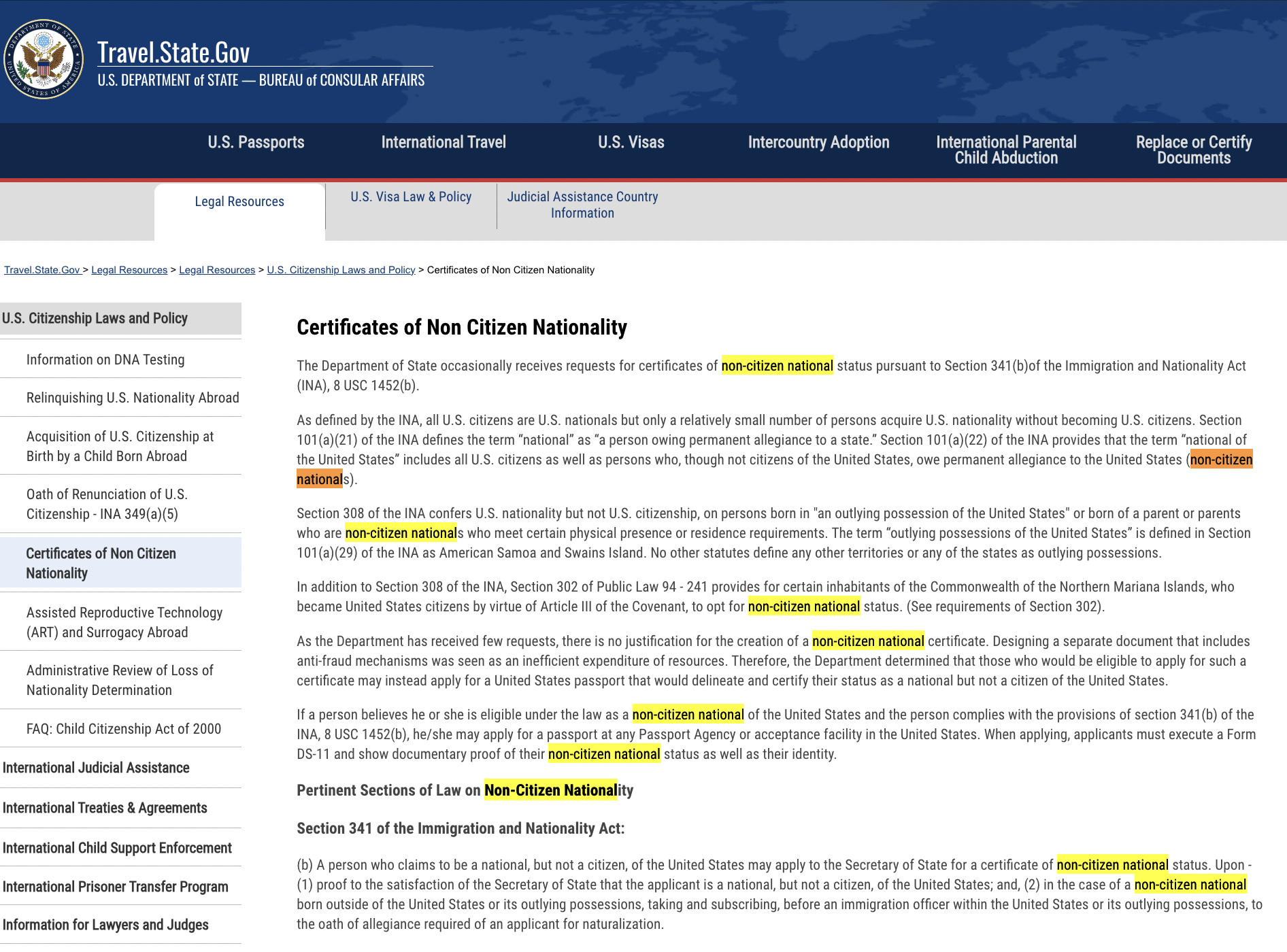IRS website as of July 3, 2024:
A U.S. national is an individual who, although not a U.S. citizen, owes their allegiance to the United States. U.S. nationals include American Samoans and Northern Mariana Islanders who chose to become U.S. nationals instead of U.S. citizens.
This information is found in Publication 501, Dependents, Standard Deduction, and Filing Information.

18 U.S. Code § 112 – Protection of foreign officials, official guests, and internationally protected persons:
For the purpose of this section “foreign government”, “foreign official”, “internationally protected person”, “international organization”, “national of the United States”, and “official guest” shall have the same meanings as those provided in section 1116(b) of this title.
8 U.S. Code § 1101 – Definitions:
(21) The term “national” means a person owing permanent allegiance to a state.
(22) The term “national of the United States” means (A) a citizen of the United States, or (B) a person who, though not a citizen of the United States, owes permanent allegiance to the United States.
8 U.S. Code § 1401 – Nationals and citizens of United States at birth:
The following shall be nationals and citizens of the United States at birth:
(a) a person born in the United States, and subject to the jurisdiction thereof;
(b) a person born in the United States to a member of an Indian, Eskimo, Aleutian, or other aboriginal tribe: Provided, That the granting of citizenship under this subsection shall not in any manner impair or otherwise affect the right of such person to tribal or other property;
(c) a person born outside of the United States and its outlying possessions of parents both of whom are citizens of the United States and one of whom has had a residence in the United States or one of its outlying possessions, prior to the birth of such person;
(d) a person born outside of the United States and its outlying possessions of parents one of whom is a citizen of the United States who has been physically present in the United States or one of its outlying possessions for a continuous period of one year prior to the birth of such person, and the other of whom is a national, but not a citizen of the United States;
(e) a person born in an outlying possession of the United States of parents one of whom is a citizen of the United States who has been physically present in the United States or one of its outlying possessions for a continuous period of one year at any time prior to the birth of such person;
(f) a person of unknown parentage found in the United States while under the age of five years, until shown, prior to his attaining the age of twenty-one years, not to have been born in the United States;
(g) a person born outside the geographical limits of the United States and its outlying possessions of parents one of whom is an alien, and the other a citizen of the United States who, prior to the birth of such person, was physically present in the United States or its outlying possessions for a period or periods totaling not less than five years, at least two of which were after attaining the age of fourteen years: Provided, That any periods of honorable service in the Armed Forces of the United States, or periods of employment with the United States Government or with an international organization as that term is defined in section 288 of title 22 by such citizen parent, or any periods during which such citizen parent is physically present abroad as the dependent unmarried son or daughter and a member of the household of a person (A) honorably serving with the Armed Forces of the United States, or (B) employed by the United States Government or an international organization as defined in section 288 of title 22, may be included in order to satisfy the physical-presence requirement of this paragraph. This proviso shall be applicable to persons born on or after December 24, 1952, to the same extent as if it had become effective in its present form on that date; and
(h)a person born before noon (Eastern Standard Time) May 24, 1934, outside the limits and jurisdiction of the United States of an alien father and a mother who is a citizen of the United States who, prior to the birth of such person, had resided in the United States.
Social Security Administration’s website as of July 3, 2024:
2. U.S. national
According to the Immigration and Nationality Act INA , a U.S. national is an individual who owes permanent allegiance to the U.S. U.S. nationals include
- All U.S. citizens.
- Certain citizens of the American Samoa (includes Swains Islands).
- Individuals born abroad to two American U.S. national parents, or individuals born abroad to one alien parent and one U.S. national parent. NOTE: There is a residency requirement placed upon the parents of the child prior to birth in order to transmit U.S. nationality.
- Certain citizens of the Commonwealth of the Northern Mariana Islands.
The Department of State website as of July 3, 3024:
As defined by the INA, all U.S. citizens are U.S. nationals but only a relatively small number of persons acquire U.S. nationality without becoming U.S. citizens. Section 101(a)(21) of the INA defines the term “national” as “a person owing permanent allegiance to a state.” Section 101(a)(22) of the INA provides that the term “national of the United States” includes all U.S. citizens as well as persons who, though not citizens of the United States, owe permanent allegiance to the United States (non-citizen nationals).

national of the united states department of travel
